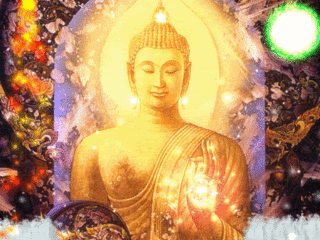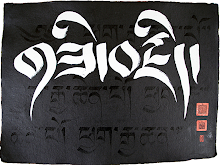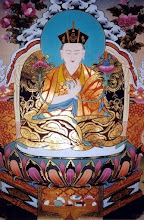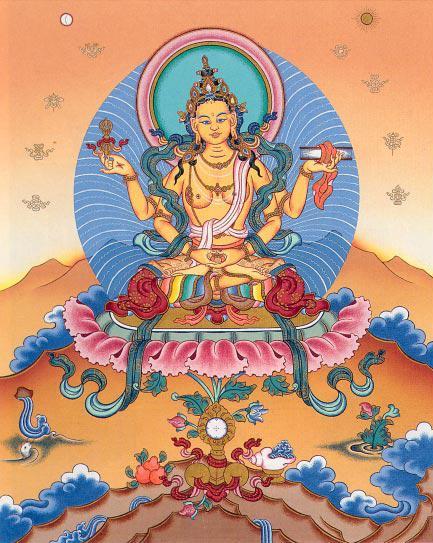Friday, 26 March 2010
Saturday, 20 March 2010
Sunday, 14 March 2010
Nonduality: Appearance and emptiness
Sunday, 7 March 2010
Understanding Dependent Origination

Today, in this tenth session, we are going to take up a very important topic in Buddhist studies and this is the teaching of dependent origination. I am aware of the fact that many people believe that dependent origination is a very difficult subject and I would not say that there is no truth in that belief. In fact, on one occasion Ananda remarked that despite its apparent difficulty, the teaching of dependent origination was actually quite simple; and the Buddha rebuked Ananda saying that in fact the teaching of dependent origination was very deep. Certainly in the teaching of dependent origination we have one of the most important and profound teachings in Buddhism. Yet I sometimes feel that our fear of dependent origination is to some extent unwarranted. There is nothing particularly difficult, for instance, in the term dependent origination. After all, we all know what dependent means, and what birth, origination or arising means. It is only when we begin to examine the function and application of dependent origination that we have to recognize the fact that we have a very profound and significant teaching. Some indication of this can be gained from the Buddha’s own statements. Very frequently, we find that the Buddha expressed His experience of enlightenment in one of two ways, either in terms of having understood the Four Noble Truths, or in terms of having understood the nature of dependent origination. Again, the Buddha has often mentioned that in order to attain enlightenment one has to understand the Four Noble Truths; or similarly, one has to understand dependent origination.
On the basis of the Buddha’s own statements, we can see a very close relationship between the Four Noble Truths and dependent origination. What is it that the Four Noble Truths and dependent origination have in common? The principle that both have in common is the principle of causality - the law of cause and effect, of action and consequence. In one of our earlier lectures we have mentioned that the Four Noble Truths are divided into two groups. The first two - suffering and the causes of suffering, and the last two - the end of suffering and the path to the end of suffering. In both of these groups, it is the law of cause and effect that governs the relationship between the two. In other words, suffering is the effect of the cause of suffering; and similarly, the end of suffering is the effect of the path to the end of suffering. Here too in regard to dependent origination, the fundamental principle at work is that of cause and effect. In dependent origination, we have a more detailed description of what actually takes place in the causal process.
Let us take a few examples that establish the nature of dependent origination. Let us take first an example used by the Buddha Himself. The Buddha has said the flame in an oil lamp burns dependent upon the oil and the wick. When the oil and the wick are present, the flame in an oil lamp burns. If either of these is absent, the flame will cease to burn. This example illustrates the principle of dependent origination with respect to a flame in an oil lamp. Let us take the example of the sprout. Dependent upon the seed, earth, water, air and sunlight the sprout arises. There are in fact innumerable examples of dependent origination because there is no existing phenomenon that is not the effect of dependent origination. All these phenomena arise dependent upon a number of causal factors. Very simply, this is the principle of dependent origination.
Particularly, we are interested in the principle of dependent origination as it applies to the problem of suffering and rebirth. We are interested in how dependent origination explains the situation in which we find ourselves here. In this sense, it is important to remember that dependent origination is essentially and primarily a teaching that has to do with the problem of suffering and how to free ourselves from suffering, and not a description of the evolution of the universe. Let me briefly list the twelve components or links that make up dependent origination. They are ignorance, mental formation, consciousness, name and form, the six senses, contact, feeling, craving, clinging, becoming, birth, and old age and death.
There are two principal ways in which we can understand these twelve components. One way to understand them is sequentially, over a period of three lifetimes: the past life, the present life and the future life. In this case, ignorance and mental formation belong to the past life. They represent the conditions that are responsible for the occurrence of this life. The following components of dependent origination - consciousness, name and form, the six senses, contact, feeling, craving, clinging and becoming - belong to this life. In brief, these eight components constitute the process of evolution within this life. The last two components - birth and old age and death - belong to the future life. According to this scheme, we can see how the twelve components of dependent origination are distributed over the period of three lifetimes, and how the first two - ignorance and mental formation result in the emergence of this life with its psycho-physical personality and how in turn, the actions performed in this life result in rebirth in the future life. This is one popular and authoritative way of interpreting the twelve components of dependent origination.
But for today, I am going to focus on another interpretation of the relation between the twelve components of dependent origination. This interpretation too is authoritative and has the support of recognized Buddhist masters and saints. This interpretation might be called a cyclical interpretation because it does not depend upon a distribution of the twelve components amongst three lifetimes. Rather, it divides the twelve components into three groups, and these are defilements (Klesha), actions (Karma), and sufferings (Duhkha). This scheme has the advantage of not relying upon a temporal distribution amongst three lifetimes. According to this scheme, ignorance, craving and clinging belong to the group of defilements. Mental formation and becoming belong to the group of actions. The remaining seven, that is, consciousness, name and form, the six senses, contact, feeling, birth, and old age and death belong to the group of sufferings. Through this interpretation we can see how the teaching of the Four Noble Truths and particularly the teaching of the Second Noble Truth - the truth of the cause of suffering, is conjoined with the teaching of karma and rebirth; and how together these two important teachings explain in a more complete way the process of rebirth and the origination of suffering.
You may recall that in the context of the Four Noble Truths, we have said that ignorance, desire and ill-will are the causes of suffering. If we look here at the three components of dependent origination that are included in the group of defilements, we will find ignorance, craving and clinging. Here too, ignorance is the most basic. It is because of ignorance that we crave for pleasures of the senses, for existence and for non-existence. Similarly, it is because of ignorance that we cling to pleasures of the senses, to pleasant experiences, to ideas and, perhaps most significantly, to the idea of an independent, permanent self. This ignorance - craving and clinging - is the cause of actions.
The two components of dependent origination that are included in the group of actions are mental formation and becoming. Mental formation refers to the impressions or habits that we have formed in our stream of conscious moments - our conscious continuum. These impressions or habits are formed by repeated actions. We can illustrate this by means of an example taken from geography. We know that rivers form their course by means of a process of repeated erosion. As rain falls on a hillside, that rain gathers into a rivulet. That rivulet gradually creates a channel for itself, and gradually grows into a stream. Eventually, as the channel of the stream is deepened and widened by repeated flows of water, the stream becomes a river which develops well-defined banks and a definite course. In the same way, our actions become habitual. These habits become part of our personality and we take these habits with us from life to life in the form of mental formation or habit energy. Our actions in this life are conditioned by the habits which we have formulated over countless previous lives. So to return to the analogy of the channel of the river and the water in it, we might say that mental formations are the channel of the river, and the actions that we perform in this life are the fresh water that flow again through the eroded channel created by previous actions. The actions that we perform in this life are represented by the component known as becoming. So here, as regards mental formation and becoming, we have the habits that we have developed over the course of countless lives combined with new actions performed in this life, and these two together result in rebirth and suffering.
To summarize, we have the defilements which may be described as impurities of the mind - ignorance, craving and clinging. These mental impurities result in actions, actions done in previous lives which have resulted in the formulation of habit energy, and actions done in the present life which on the whole are liable to conform to the patterns established in previous lives. Together, these impurities of the mind and these actions result in rebirth. In other words, they result in consciousness, in name and form, in the six senses, in contact between the six senses and the objects of the six senses, in feeling which is born of that contact, in birth, and in old age and death. In this interpretation, the five components of dependent origination included in the groups of defilements and actions - ignorance, craving, clinging, mental formation and becoming - are the causes of rebirth and suffering. Consciousness, name and form, the six senses, contact, feeling, birth, and old age and death are the effects of the defilements and actions. Together, the defilements and actions explain the origin of suffering and the particular circumstances in which each of us find ourselves, in which we are born.
You may recall that in one of our earlier lectures, we refer to the fact that whereas the defilements are common to all living beings, actions differ from individual to individual. So whereas the defilements account for the fact that all of us are prisoners within samsara, yet actions account for the fact that some are born as human beings, others are born as gods, and others as animals. In this sense, the twelve components of dependent origination present a picture of samsara with its causes and its effects.
There would be no point in painting this picture of samsara if we do not intend to use this picture to change our situation, to get out of samsara. It is in this sense that recognizing the circularity of samsara, the circularity of dependent origination is the beginning of liberation. How is this so? So long as defilements and actions are present, rebirth and suffering will occur. When we see that repeatedly, ignorance, craving, clinging and actions will lead to rebirth and suffering, we will recognize the need to break this vicious circle.
Let us take a practical example. Suppose you are looking for the home of an acquaintance whom you have never visited before. Suppose you have been driving about for half an hour or more and have failed to find the home of your friend, and suppose suddenly you recognize a landmark that you saw half an hour previously. Suppose you again come upon the landmark, and it dawns upon you that you have passed the landmark half an hour ago. At that moment it will also probably dawn upon you that you have been going around in circles, and you will stop and look at your road guide, or enquire the way from a passer-by so as to stop going around in circles and reach your destination. This is why the Buddha has said that he who sees dependent origination sees the Dharma and he who sees the Dharma sees the Buddha. This is why the Buddha has, as I have mentioned earlier, said that understanding dependent origination is the key to liberation. So once we see the functioning of dependent origination, we can then set about breaking this vicious circle of dependent origination. We can do this by removing the impurities of the mind - ignorance, craving and clinging. Once these impurities are eliminated, actions will not be performed, and habit energy will not be produced. Once actions cease, rebirth and suffering will also cease.
I would like to spend a little bit of time on another important meaning of dependent origination and that is dependent origination as an expression of the Middle Way. During one of our earlier lectures, we had occasion to refer to the Middle Way, and on that occasion we confined ourselves to only perhaps the most basic meaning. We have said that the Middle Way means avoiding the extreme of indulgence in pleasures of the senses and the extreme of self-mortification. In that context the Middle Way is synonymous with moderation. Now in the context of dependent origination, the Middle Way has another meaning which is related to the earlier meaning but deeper. In this context the Middle Way means avoiding the extremes of eternalism and nihilism. How is this so? The flame in the oil lamp exists dependent upon the oil and the wick. When either of these are absent, the flame will be extinguished. Therefore, the flame is neither permanent nor independent. Similarly, this personality of ours depends upon a combination of conditions - defilements and actions. It is neither permanent nor independent. Recognizing the conditioned nature of our personality, we avoid the extreme of eternalism, of affirming the existence of an independent, permanent self. Alternatively, recognizing that this personality, this life does not arise through accident, or mere chance, but is instead conditioned by corresponding causes, we avoid the extreme of nihilism, the extreme of denying the relation between action and consequence. While nihilism is the primary cause of rebirth in states of woe and is to be rejected, eternalism too is not conducive to liberation. One who clings to the extreme of eternalism will perform wholesome actions and will be reborn in states of happiness, as a human being or even as a god, but he will never attain liberation. Through avoiding these two extremes, through understanding the Middle Way, we can achieve happiness in this life and in the future life by performing wholesome actions and avoiding unwholesome actions, and eventually we can achieve liberation.
Buddha Dharma education association













































.jpg)






